
7 Commonly Greenwashed Products and Their Best Alternatives
Updated: October 3 2024
Lots of people are trying to buy greener now. And companies are taking advantage of this by creating an environmentally friendly image. They talk about the good things they’re doing for the environment without doing anything to reduce their carbon footprint. They may claim their products are eco friendly. But their production or disposal harms nature. Greenwashing is harmful when companies use it as an excuse not to take real action on environmental issues.
But today, shoppers have become savvier. 72% of Australian shoppers rank ethical brand behaviour in their top three priorities when buying products. They’re eager to know that the products they buy are good for the environment.
Below are some ways you can spot greenwashed products and the alternatives that are better for you and the planet.
What is Greenwashing?
Definition of Greenwashing
Greenwashing is a marketing tactic where companies make false or misleading claims about the environmental benefits of their products or services. This can range from exaggerating the eco-friendliness of a product to hiding the true environmental impact of a company’s operations. Often, companies use misleading labeling or packaging to create an illusion of sustainability. Whether intentional or not, greenwashing is primarily used to boost sales and profits by appealing to environmentally conscious consumers. This practice can erode trust and make it harder for consumers to make genuinely eco-friendly choices.
Why is Greenwashing a Problem?
Environmental Impact
Greenwashing poses a significant problem due to its environmental impact. When companies make false or misleading claims about their environmental benefits, it leads to consumer confusion and mistrust. This often results in uninformed purchasing decisions that can harm the environment. For instance, a product labeled as biodegradable might actually take hundreds of years to decompose, contributing to plastic waste and pollution. This not only harms wildlife and ecosystems but also exacerbates the climate crisis.
Moreover, greenwashing undermines the efforts of companies genuinely committed to sustainability. When false claims are rampant, it creates a lack of trust among consumers, making it difficult for truly environmentally friendly companies to be taken seriously. This can stifle progress towards a more sustainable future and perpetuate harmful environmental practices.
7 common greenwashed products and alternatives to buy
1. Pawpaw balms
Pawpaw or papaya has lots of medicinal benefits. Studies show that its fruit extract has anti inflammatory benefits. It helps in wound healing and other skin conditions.
The therapeutic uses of this natural ingredient make pawpaw balm a good product. It's an attractive product for consumers looking for natural remedies. But products marketed as natural pawpaw ointments may be harmful to the environment due to some added ingredients.
Take Lucas' Papaw Ointment as an example. It contains little pawpaw in the product: 39mg/g or only 3.9% pawpaw. It's mostly made from petroleum jelly. It's not that it's going to cause irritation or allergies. But it's not the best choice as far as its environmental impacts are concerned.
A good alternative is the Pure Papayacare Papaya & Calendula Ointment. This product is 100% natural and has a gentle formula that is suitable for sensitive skin.
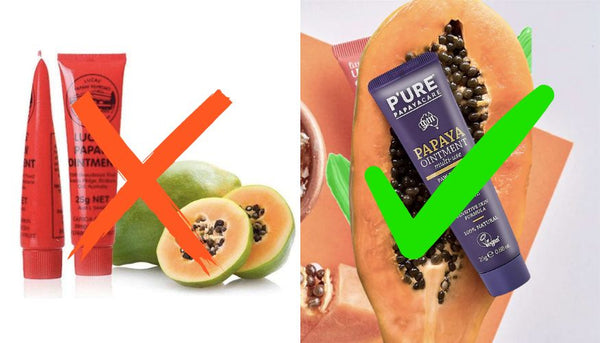
2. Degradable cling wraps (supermarket brands)
Degradable plastics appear as greener alternatives to regular plastics. But the term itself is greenwashing. Degradable plastics are petroleum based. They have other chemicals and heavy metals added to them as well. They can naturally break down, but it could take hundreds of years. It can break up into smaller pieces that can make their way into the ocean. These micro plastics can be mistaken by aquatic life for food. And eventually find their way into our bellies.
The Multix Greener Degradable Cling Wrap is, as the name suggests, degradable not biodegradable. Because the word degradable in itself is confusing, this confuses customers when they're reaching for it on the supermarket shelf.
A better alternative is the Biotuff Compostable Cling Wrap. It's a biodegradable cling wrap alternative made from plant based thermoplastic. It's certified compostable, eco friendly, and sustainable.
If you're looking for other alternatives to cling wrap, you can look into reusable beeswax food wraps, vegan food wraps, silicone based wraps, and fabric food wraps.
 |
 |
3. Bin bags/liners made from partly recycled plastic to reduce plastic waste
Products that say “50% recycled plastic” on their labels can confuse consumers. An example of this is the Glad to be Green 50% Ocean Plastic Recycled Bags.
“Ocean bound plastic” is a tricky term. It refers to plastics “collected from communities with no formal waste management system within 50km of the shore line.” Glad is one of the companies greenwashing their products. They're tricking consumers into thinking that their 50% Ocean Plastic Recycled Bags got pulled from the seas, which isn't the case.
Not only is the plastic partly recycled and single use, but it's also not compostable. It is keeping plastic out of landfill, but it's still not a great environmental choice.
But there's a good alternative to Glad plastic bags, and it's the Biotuff Compostable Bin Liners. They're plant based and certified compostable, and free from any plastic additives.
There are lots of other good compostable bag choices right here.
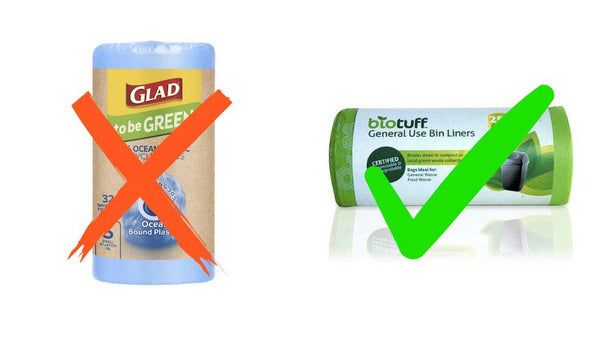
4. Bottled water (bottle made of single use, recycled plastic) with a lower carbon footprint
Single use plastic is hard to recycle. The production of it just about cancels out the environmental benefits of recycled plastic. There are about 300 million tons of plastics produced each year. And half of this is for single use items alone. There are serious problems associated with its use. One is finding these in oceans and killing marine animals in the process.
Coca-Cola’s Mount Franklin Pure Australian Spring Water uses 100% recycled plastic. They may avoid using around 10,000 tonnes of new plastic each year using recycled plastic water bottles. However, Coca-Cola has been criticized for being one of the world's largest plastic polluters and accused of greenwashing. For instance, Coca-Cola Life is marketed as a healthier alternative despite containing high sugar levels, and the company's commitment to sustainability is often viewed as insufficient and misleading. But why are we buying water in the first place when there’s perfectly good water coming out of our taps?
Using reusable items, including reusable water bottles, remains one of the top eco friendly choices to reduce plastic consumption. One good example of this is the Ever Eco Stainless Steel water bottle. It’s BPA free, leak proof, and durable. You can find loads of other reusable water bottle options at Hello Charlie, too.
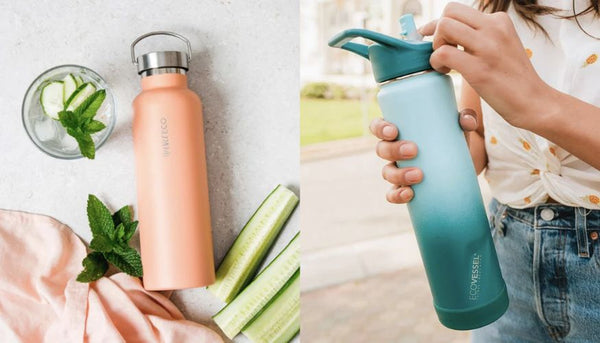
5. Flushable wipes
The term “flushable wipes” gives an impression that they’re like toilet paper and break down straight away in your loo. But this isn’t necessarily true.
There were a number of brands claiming flushable wipes that were actually causing major issues in sewerage systems around the world.
Kleenex was at the centre of a legal battle in 2016. There were allegations about false representations on the flushability of its toilet wipes. Since then, they’ve released a different product that passes various industry tests on flushability.
The US Environmental Protection Agency has also been involved in regulating misleading environmental claims, highlighting the importance of accurate labeling.
Despite passing the tests, these flushable wipes contain butoxy PEG-4 PG-amodimethiconepolysorbate-20. These wipes could be contaminated with carcinogenic ethylene oxide, as well as 1,4-dioxane. These are possibly carcinogenic and have some risks for causing aquatic toxicity
Wipes that are “certified flushable” may imply that these are eco friendly. But some products can contain ingredients that have potentially negative effects on human health and the environment.
If you need to flush your wipes, use 100% plastic free wipes with good ingredients. The Natracare Safe to Flush Moist Toilet Tissues has an organic and natural formula. These wipes are certified and guaranteed fine to flush according to WATER UK.
Alternatively, install a bidet; or simply keep a spray bottle next to the toilet and create moist wipes.
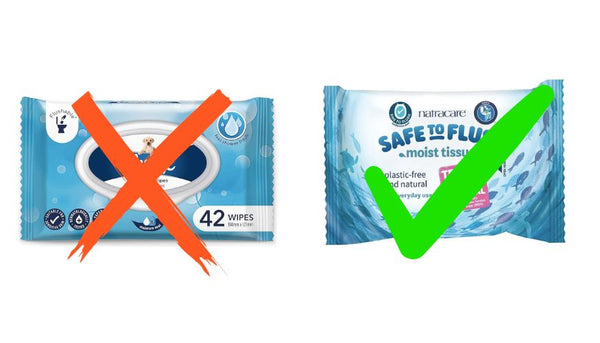
6. "Botanical" shampoo
Many “natural” or “botanical” or “bio” shampoo brands claim to be green. They do this by highlighting a few plant based ingredients or formulas on their products. But this can be misleading. Downplaying the fact that some products contain irritating or allergy inducing ingredients can be a sign of greenwashing. Some brands falsely advertise a positive environmental impact to attract eco-conscious consumers. An example of this is the Herbal Essence Bio:Renew Shampoo.
Bio:renew is a marketing term used to promote the product’s “signature blend of natural, botanical ingredients”. It may sound like it’s greener, but the ingredients list says otherwise. There are only two natural ingredients: aloe vera and argan oil. The rest are synthetic, irritating, allergen inducing, and problematic components like sulphates (SLS and SLES) to MI/MCIsynthetic fragrance
A better alternative is The ANSC Original Solid Shampoo Bar. The ANSC has a range of solid shampoo bars that contain good natural ingredients. They’re highly concentrated, don’t have any water (so you get value for money) and are plastic free. They’re perfect for all hair types, too.
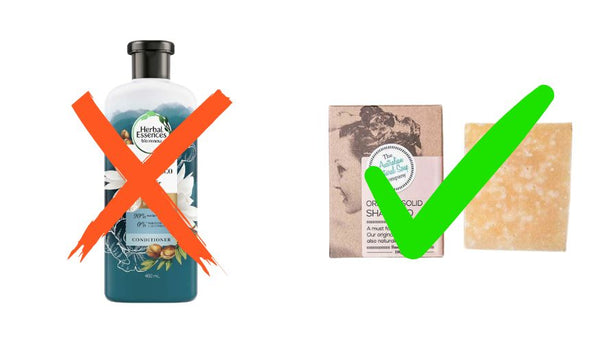
7. “Natural” and eco friendly cleaning products
Natural cleaning products are also common targets for greenwashing. It’s important to be able to spot generic or vague claims about supposedly green cleaning products, because there can be health issues like asthma and allergies at stake.
There are many considerations for cleaning products to be sustainable. It can range from minimal to zero presence of harmful chemicals to low environmental toxicity. Some greenwashing examples - household products like the Earth Choice Dishwash Liquid positions itself as a product for “natural clean.” But this product is questionable. The ingredients list is full of synthetic chemicals, irritants, and unspecified ingredients.
Even certifications like those from the Forest Stewardship Council can sometimes be misleading, as seen in cases where illegally sourced timber was still accredited.
One truly green clean is the Kin Kin Naturals Dishwashing Liquid. It’s got good ingredients, is fully biodegradable and is safe for people and the planet.
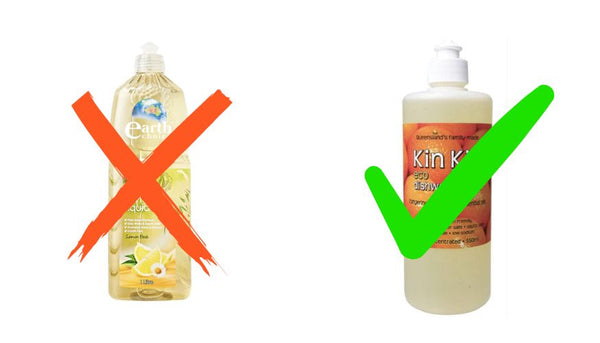
Know what you're buying to avoid using products with false environmental claims
When you're shopping for essentials, make it a habit to know the products you're buying. Familiarise yourself with common “green marketing claims”. Learn how to spot what's true and what's not. This way you'll know how you can avoid purchasing greenwashed items.
Conclusion
Make Informed Choices
To avoid falling victim to greenwashing, it’s essential to make informed choices. Here are some tips to help you spot greenwashing:
-
Be wary of companies that make exaggerated or unsubstantiated environmental claims.
-
Check the company’s track record on environmental issues.
-
Look for third-party certifications or audits that verify a company’s environmental claims.
-
Be cautious of companies that use greenwashing language in their marketing campaigns.
-
Research the company’s supply chain and manufacturing processes to ensure they align with environmental values.
By being aware of greenwashing and making informed choices, you can help create a more sustainable future. Remember, every purchasing decision you make has an impact on the environment, so choose wisely.




